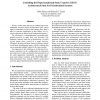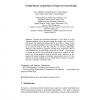667 search results - page 96 / 134 » Making decisions based on the preferences of multiple agents |
ATAL
2009
Springer
14 years 3 months ago
2009
Springer
In hedonic games, players have the opportunity to form coalitions, and have preferences over the coalitions they might join. Such games can be used to model a variety of settings ...
CORR
2008
Springer
13 years 9 months ago
2008
Springer
A common objective in mechanism design is to choose the outcome (for example, allocation of resources) that maximizes the sum of the agents' valuations, without introducing in...
ICSE
2004
IEEE-ACM
14 years 9 months ago
2004
IEEE-ACM
Because it takes time and trust to establish agreement, traditional consensus-based architectural styles cannot safely accommodate resources that change faster than it takes to tr...
LSO
2004
Springer
14 years 2 months ago
2004
Springer
Selection of Commercial-off-The-Shelf (COTS) software products is a knowledge-intensive process. In this paper, we show how knowledge bases can be used to facilitate the COTS selec...
EKAW
2004
Springer
14 years 2 months ago
2004
Springer
Capturing and exploiting knowledge is at the heart of several important problems such as decision making, the semantic web, and intelligent agents. The captured knowledge must be a...


